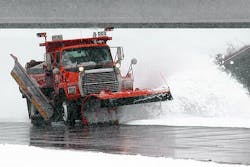Carnegie Mellon to apply synthetic vision technology to help keep snow plows safe on the road
Officials of the U.S. Federal Highway Administration (FHWA) in Washington announced a $1.5 million contract to Carnegie Mellon on Friday for the Advanced, Low-Cost Snowplow Visual Guidance System. The FHWA is a bureau of the U.S. Department of Transportation.
Carnegie Mellon researchers will develop a prototype visual guidance system to help snowplow operators see in low- and zero-visibility conditions like blizzards, rural nighttime operations, super-cooled fog, and other high-visual-impairment situations.
Related: Companies to develop synthetic-vision to operate helicopters in blinding dust
Researchers at Carnegie Mellon will gather and synthesize sensor data and display it on screens that could be installed in a snowplow's cab to help drivers plow efficiently, drive safely along their designated routes, and avoid obstructions and other vehicles in zero-visibility winter conditions.
The project will involve digital imaging, digital multidimensional mapping, global positioning systems (GPS), sensing involving radar, light direction and ranging (LiDAR), and forward-looking infrared-based (FLIR), and related emerging and existing technologies, FHWA officials say.
Federal transportation officials chose Carnegie Mellon for this project, in part, for the university's experience in advanced digital imaging and displays, including augmented reality, virtual reality, synthetic vision, and advanced user displays such as heads-up displays (HUDs), visors, and other wearable technology.
Carnegie Mellon will develop a prototype snowplow vision system that can be tested and evaluated on the road in degraded-vision conditions that will be ready for further validation, enhancement and field use. It remains to be seen how this kind of technology might be received by state and municipal labor unions -- especially if this system could track their movements via GPS.
For more information contact Carnegie Mellon University online at www.cmu.edu, or the Federal Highway Administration at www.fhwa.dot.gov
